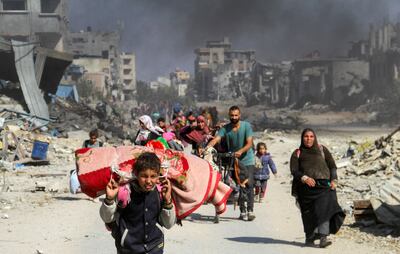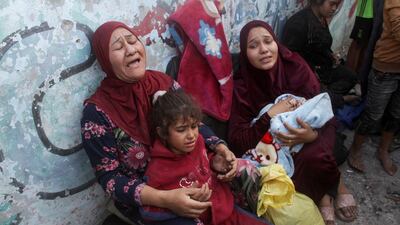Live updates: Follow the latest on Israel-Gaza
Gazans who fled to western areas of Gaza city after the Israeli military ordered them to leave their homes in the besieged north of the enclave say they do not know where to go next after being told to move once again.
Israel's army on Thursday dropped leaflets telling people to leave the city's Sheikh Radwan, Nasser and Al Shati neighbourhoods and move farther south because these areas were now considered active conflict zones. But with most homes and places of shelter destroyed after more than a year of Israeli bombardment in Gaza, there are few options for these displaced families.
“What does the occupation want from us? What does the world want from us? It feels like we were born only to die and be slaughtered,” said Nasreen Al Aimawi, 38, who moved into a tent in Sheikh Radwan with her four children after leaving Jabalia in the north two weeks ago.
“Every couple of days, we’re told to evacuate and leave. We’re civilians – women, children. Our men have been martyred or imprisoned,” said Ms Al Ajmawi, whose husband was killed five months ago.
“Yesterday, we ended up on the street next to Yarmouk Stadium. There’s no place to shelter us, no one looking out for us. We’re living a nightmare of catastrophe, death, loss, displacement, homelessness and every form of suffering. No one sees us, no one cares.”
displaced resident of Beit Lahia
Maher Al Masri, 23, told The National the new Israeli eviction order came just three days after he moved from the northern town of Beit Lahia to the Mukhabarat area in north-west Gaza city. “We haven’t even recovered from the first displacement,” he said. “We can’t handle this constant displacement and homelessness. We haven’t moved from west Gaza again because we simply can’t. We don’t have the money to leave, and there’s nowhere else to go.”
Beit Lahia and neighbouring Jabalia have been under Israeli siege and attack since early October, resulting in hundreds of deaths and the destruction of homes. Residents who followed Israel's eviction orders have reported coming under attack despite following designated “safe routes”, while those who remain face starvation because of the lack of aid deliveries to the area, which lies just north of Gaza city.
Dozens of aid lorries entered Gaza city on Thursday, according to a relief worker who asked to not to be named.
“There are promises to increase aid quantities for northern Gaza, and we are awaiting this. However, based on past experience, Israel often reneges on its promises and commitments,” he said.
“The aid that reaches us is limited compared to the actual needs, and Israel places obstacles on the entry of many items, allowing only a specific number of trucks weekly for us and other organisations operating in northern Gaza.”
“The items Israel permits include legumes, grains, canned goods and flour, and occasionally vegetables and meat, but this is very rare,” he explained. “We hear about US pressure on Israel to allow aid into northern Gaza, but this only results in a brief opening for a day or two, after which the situation deteriorates again, and aid is blocked once more.”

He said the humanitarian needs in northern Gaza were immense, but the aid coming in met only a tiny fraction of those needs. “We currently operate several aid distribution points in Gaza city, but on many days we find ourselves without anything to distribute because Israel does not allow sufficient quantities to enter.”
Mohammad Labad, 31, lives in Sheikh Radwan district with his wife and three children and is hoping for any aid he can get.
“Aid is very scarce in northern Gaza, and the food items distributed are limited,” he told The National on Friday. “Unfortunately, there’s no meat or vegetables. These items are available to traders from time to time, but they’re sold at very high prices.”
Every two or three days, Mr Labad checks with aid distribution organisations to see whether his name is on the list to receive a food parcel. “They tell me, ‘We’ll send you a message when it’s your turn.’ Now, every time I get a message on my phone, I pray it’s the one, that it’s a food parcel with something to feed my children,” he said.
“I’m hopeful that this week something will come through since more trucks arrived yesterday than any other day and reached the organisations’ warehouses.”
Ramzi Al Kahlout, 42, who has a family of nine, said he had not received any aid since they were displaced from Jabalia to Gaza city a month ago.
“We’ve heard talk of a new crossing to bring in aid, but unfortunately, this is all just deception, because the problem isn’t with the crossings. The crossings are there and operational; the problem is that the occupation wants to starve us,” Mr Al Kahlout said.
“Every day, we see trucks entering northern Gaza, but sadly, it’s never enough to meet the needs of the people and the displaced, who are in the hundreds of thousands.”


